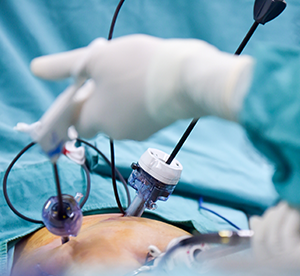
Oophorectomy is a surgical procedure that involves the removal of one or both ovaries. While it is not typically performed as a primary treatment for Pelvic Inflammatory Disease (PID), in severe cases where the infection has caused significant damage to the ovaries or if there are abscesses that do not respond to other treatments, oophorectomy may be considered.
During the oophorectomy procedure, the patient is placed under general anaesthesia to ensure their comfort and safety. The surgeon makes small incisions in the lower abdomen to access the pelvic organs. The affected ovary or ovaries are carefully identified, and blood vessels and other structures are sealed or ligated to prevent bleeding. The ovaries are then detached from the surrounding tissues and removed from the body.
Oophorectomy can be performed as a traditional open surgery or using a minimally invasive approach, such as laparoscopy. Laparoscopic oophorectomy involves inserting a thin, lighted tube with a camera (laparoscope) and specialised surgical instruments through small incisions. This approach offers benefits such as smaller incisions, reduced postoperative pain, shorter hospital stays, and faster recovery compared to open surgery. After the oophorectomy procedure, the patient will be closely monitored in the recovery area. Pain medication may be prescribed to manage any discomfort experienced during the healing process. Hormone replacement therapy may be considered for women who undergo bilateral oophorectomy (removal of both ovaries) to manage menopausal symptoms and prevent long-term health issues associated with hormone deficiency.
Oophorectomy is a significant surgical procedure with potential implications for fertility and hormonal balance. Before proceeding with oophorectomy, a thorough evaluation of the patient's condition and discussion of the potential risks, benefits, and alternatives will take place. Whenever possible, preserving ovarian function and fertility is a priority, and oophorectomy is typically reserved for cases where conservative treatments have been ineffective or the risks of complications outweigh the benefits.
At MASSH, our dedicated team of healthcare professionals provides comprehensive care for women with pelvic inflammatory disease and related conditions. We prioritise preserving reproductive function and offer personalised treatment plans tailored to each patient's unique needs. If oophorectomy is deemed necessary, we ensure thorough preoperative counselling and ongoing support throughout the entire process. For further information or to schedule a consultation, please contact MASSH.We are committed to providing compassionate care and helping you make informed decisions about your reproductive health.
Embark on a journey of exceptional healthcare guided by industry's true luminaries who consistently exceed
expectations and set new benchmarks for excellence in everything from cutting-edge innovations to personalized care.
MASSH Group of Hospitals is a trusted name in delivering advanced healthcare solutions with a network of premier super speciality hospitals, committed to providing ethical, compassionate, and innovative care. Our expanding network ensures that cutting-edge medical services are always within your reach.